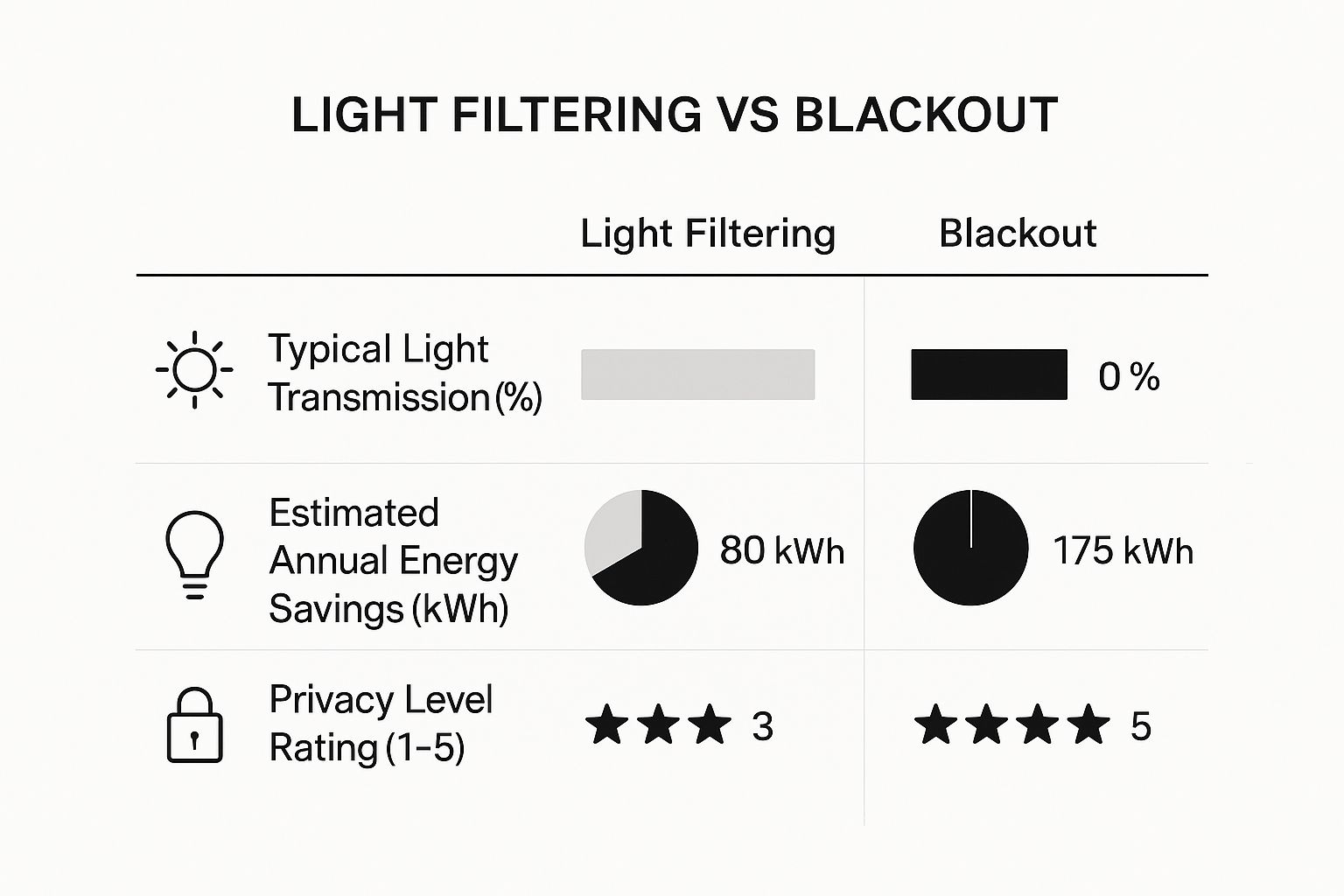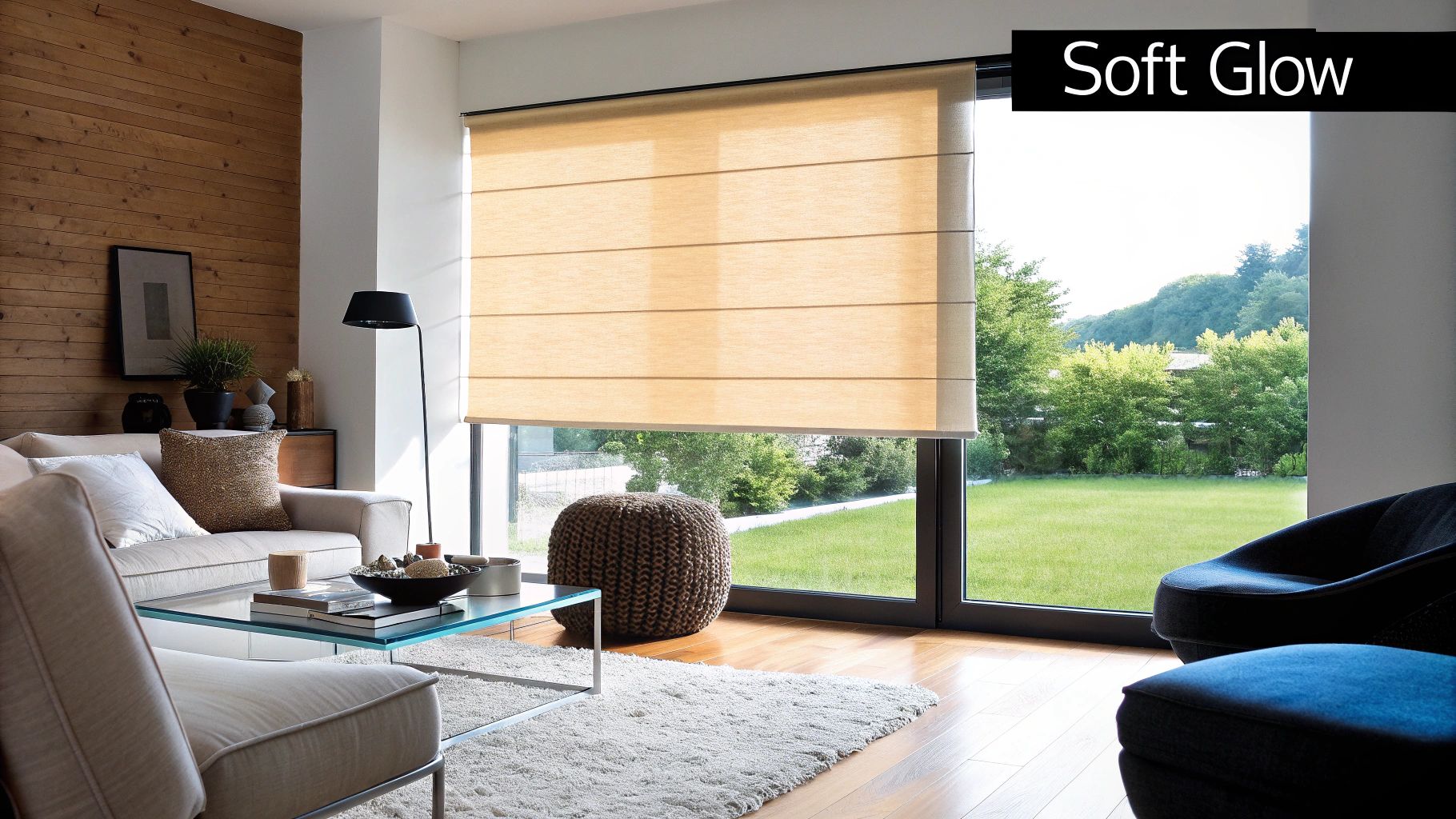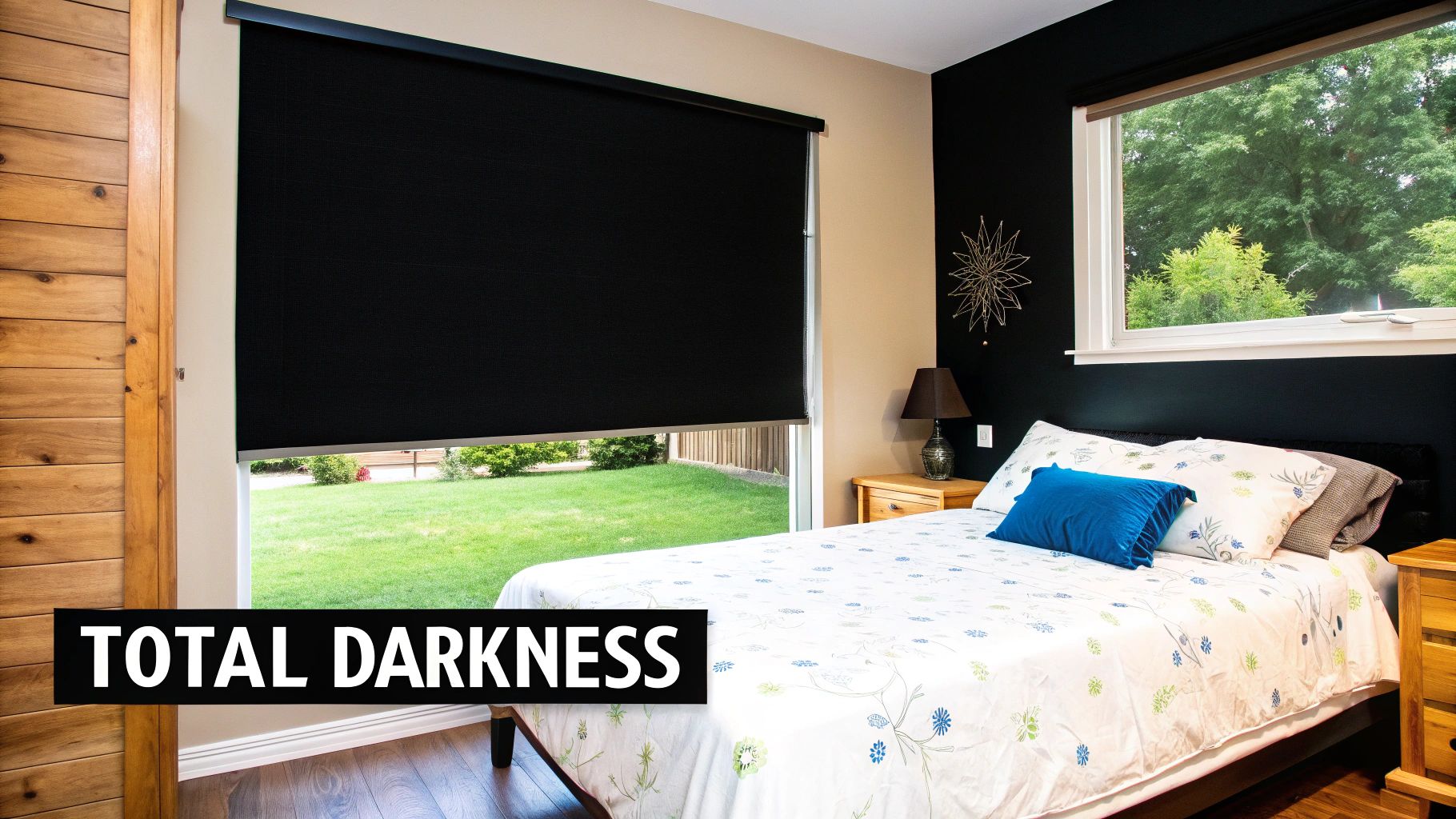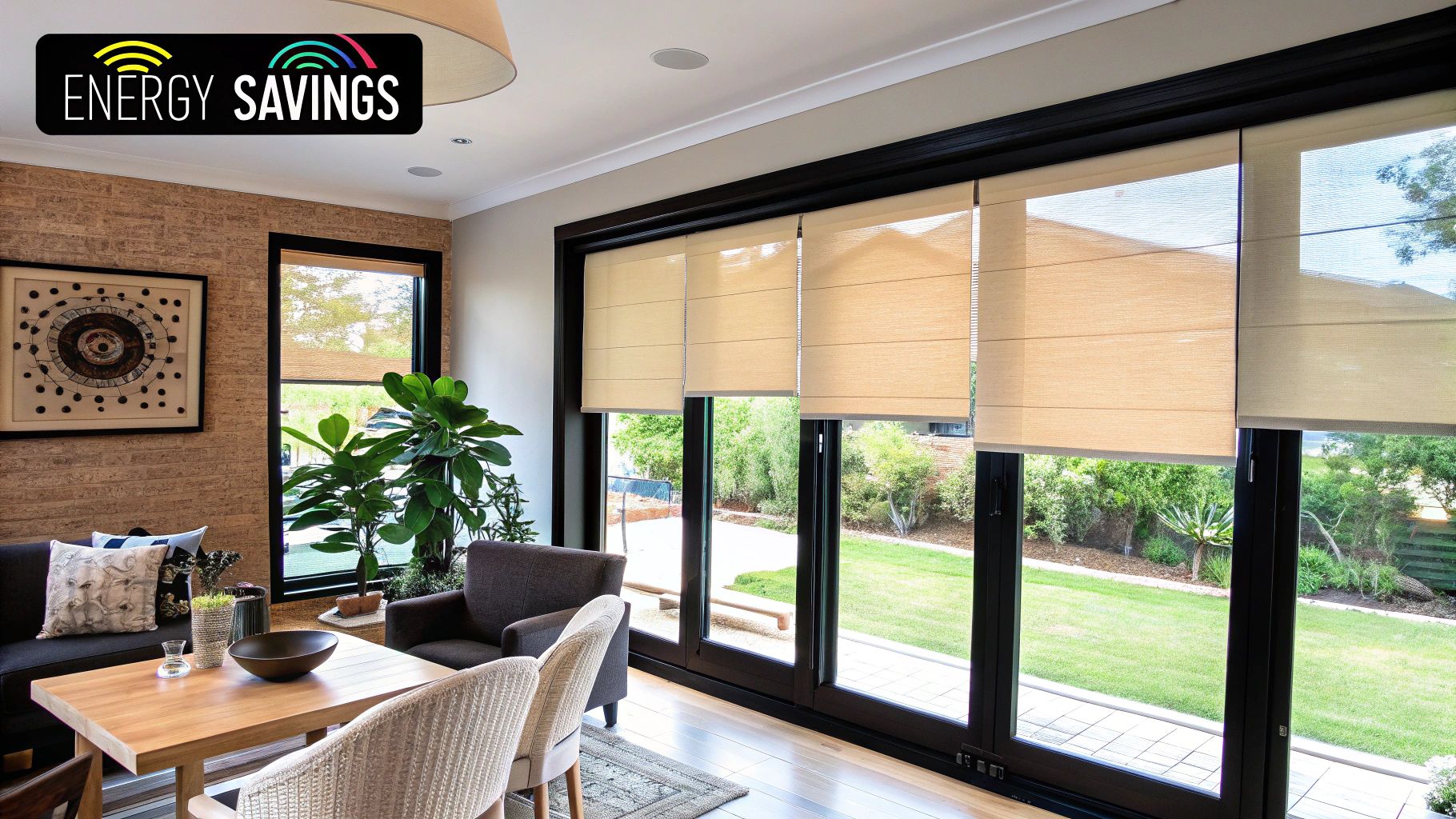Light Filtering vs Blackout Shades: A Guide for Delmarva Homeowners
- Johann Reardon
- Aug 25, 2025
- 10 min read
TL;DR: Light filtering shades soften and diffuse sunlight to create a warm, inviting glow, making them perfect for living rooms, kitchens, and offices. Blackout shades are designed to block nearly all incoming light, offering complete darkness and privacy, which is ideal for bedrooms, nurseries, and home theaters. Your choice depends on whether you want to gently manage daylight or completely control it.
A Quick Guide to Light Filtering vs Blackout Shades
Trying to decide between light filtering and blackout shades for your Delmarva home? It’s a common dilemma, and at [Home Blinds & Floors](https://www.homeblindsandfloors.com/), we help homeowners across the Eastern Shore find the perfect balance of style, light control, and privacy with custom window treatments tailored to your space. The right shade doesn't just look good; it completely changes the feel and function of a room. The best choice almost always comes down to how you use that specific space.
This side-by-side comparison really highlights the distinct advantages of each shade type when it comes to controlling light, saving energy, and ensuring privacy.

As you can see, both options have their place, but blackout shades clearly excel when maximum privacy and light-blocking are the top priorities.
Core Differences Between Shade Types
To get a better handle on the options, it helps to explore the construction of various types of shades and see how they're engineered for different purposes.
This quick table breaks down the key distinctions to help you match the right shade to the right room.
Core Differences Between Shade Types
Feature | Light Filtering Shades | Blackout Shades |
|---|---|---|
Light Control | Diffuses and softens natural light, which cuts down on harsh glare. | Blocks 95-100% of incoming light, creating near-total darkness. |
Privacy Level | Gives you great privacy during the day, but silhouettes can sometimes be visible at night. | Offers complete, impenetrable privacy, both day and night. |
Best For | Living rooms, kitchens, home offices, and sunrooms where you want natural light. | Bedrooms, nurseries, home theaters, and media rooms where darkness is key. |
Ambiance | Creates a bright, warm, and welcoming atmosphere. | Fosters a dark, cozy, and intensely private environment. |
Ultimately, the goal is to enhance how you live in each room. Light filtering shades are about embracing daylight, while blackout shades are about having total control over it.
Choosing the Right Shade Material for Your Delmarva Home
When you get down to it, the heart of the light filtering vs. blackout shades debate is all in the construction. The materials, the density of the weave, and any special backings are all intentionally engineered to either invite sunlight in or shut it out completely. Understanding this "fabric science" is really the secret to choosing the right shades for your home, whether you're in Salisbury or Easton.
Light-filtering shades are all about creating a soft, ambient glow. They’re typically made from fabrics like polyester blends, linen, or cotton that are woven loosely. Think of the fabric as a soft-focus lens for the sun; it scatters the harsh rays, cutting down on glare and protecting your furniture from UV damage, all while keeping the room bright and welcoming.
Home Blinds & Floors offers a wide selection of custom blinds and shades in Delmarva, with expert installers who bring the showroom to your living room. We make it easy to understand these important details, so you can see firsthand how fabrics play with your natural light before you make a decision.

The Science Behind Blackout Technology
Blackout shades have a totally different mission: complete light obstruction. Their secret lies in using materials that are naturally opaque or have been specifically treated to stop light in its tracks. There are a couple of common ways manufacturers achieve this.
One popular method is using multi-layered fabrics, where a decorative fabric you see is bonded to one or more light-blocking layers behind it. Another incredibly effective technique involves applying a specialized foam or vinyl backing to the fabric. This opaque backing not only blocks light but also adds a layer of thermal insulation—a huge plus for managing energy bills in Delmarva's climate.
It all comes down to the intention behind the weave and backing. Light-filtering fabrics are designed with a certain sheerness to gently manage light. Blackout materials are built with dense, layered, or coated constructions to eliminate it entirely.
Common Materials and How They Perform
The material you land on will directly affect your shade's performance, how long it lasts, and its overall look. Here’s a quick rundown of what you'll find:
Polyester: This is a true workhorse, used in both types of shades. For light-filtering options, it's woven loosely to create a sheer effect. In blackout shades, it’s often coated or layered with other materials to make it completely opaque.
Vinyl: Known for its total light-blocking power, vinyl is a go-to for many roller and vertical blackout shades. It’s also a breeze to clean and incredibly durable, which makes it a smart choice for busy areas of the house.
Natural Fibers (Linen, Cotton): If you love a soft, organic texture, you’ll find these materials in beautiful light-filtering Roman shades. They diffuse light beautifully but will need a separate blackout liner added if you want to fully block the sun.
Getting a handle on these material differences is what ensures you end up with a shade that doesn't just look great, but also does exactly what you need it to do—whether that’s creating a sun-drenched kitchen in Rehoboth Beach or a dark, peaceful bedroom in Ocean Pines.
Benefits of Light Filtering vs. Blackout Shades in Eastern Shore Homes
When you’re weighing light-filtering vs. blackout shades, your final choice really boils down to two things: how much sun you want to let in, and how much privacy you need. These two factors are what truly define the feel and function of any room in your Delmarva home.
Light-filtering shades are all about managing natural light, not killing it completely. Think of them as a soft-focus lens for the sun. They cut the harsh glare and block damaging UV rays, but they still let a warm, inviting glow permeate the space. This makes them a fantastic fit for common areas where you want to keep things feeling bright and open.
Blackout shades, on the other hand, are engineered for one primary purpose: complete light obstruction. They are built to create a dark, quiet environment that’s perfect for sleeping or watching a movie.

A Closer Look at Light Control
The difference in light-blocking power isn't subtle; it's significant. Light-filtering shades are designed to let 5% or more of natural light pass through. You get a well-lit room without the blinding glare of direct sun.
In stark contrast, blackout shades are built to block 95-100% of all incoming light, plunging a room into near-total darkness. This is what makes them the go-to choice for bedrooms and nurseries. The way these fabrics are constructed is the secret behind these drastically different results.
As a local, family-run business, Home Blinds & Floors provides personal service, competitive pricing, and professional installation throughout Sussex, Wicomico, Kent, and beyond. We’re here to help you find that perfect balance of light and privacy for every single room.
How Each Shade Type Affects Privacy
Your privacy needs can shift dramatically from day to night, and this is where you’ll see the biggest difference between the two shade types.
Daytime Privacy: During the day, both options do a great job. Light-filtering shades blur the view from outside, so you can enjoy the daylight without feeling like you’re in a fishbowl.
Nighttime Privacy: This is the game-changer. Once it's dark out and you flip on the lights, light-filtering shades can reveal silhouettes and shadows to anyone outside. If you need guaranteed privacy after sunset, blackout shades are the only way to go.
Blackout shades provide complete, round-the-clock privacy. This makes them a must-have for bedrooms, bathrooms, or any home in a busy Delmarva town like Ocean City or Rehoboth Beach where your neighbors are just a few feet away.
For homeowners who need the absolute best light-blocking solution, it's worth taking a moment to learn more about the best window shades for privacy and style in Delmarva homes in our comprehensive guide. It’ll help you pick a product that truly delivers the darkness and privacy you're after, turning any room into your own private retreat. It all comes down to matching the shade’s performance to the room’s purpose.
Maximizing Energy Efficiency and Home Comfort
When you're deciding between light-filtering and blackout shades, you’re doing more than just picking a style—you're making a choice that directly impacts your home's energy use and comfort level. Especially here in Delmarva, with our hot summers and chilly winters, the right window treatments are a critical layer of insulation that can help you manage your energy bills all year long.
Blackout shades are the heavy hitters when it comes to thermal performance. Their dense, often multi-layered construction is specifically designed to create a powerful barrier against the outdoors. In the summer, they are fantastic at blocking solar heat gain, stopping the sun from baking your rooms and making your AC unit work overtime. Come winter, they do the reverse, holding onto your home's warmth and preventing it from seeping out through the glass.
Light-filtering shades also contribute to home efficiency, just in a more subtle way. They work by diffusing intense, direct sunlight, which cuts down on the amount of solar heat coming into a room. This can take a noticeable load off your cooling system during the hottest parts of the day, all while keeping your space bright and welcoming with natural light.
Of course, your shades are only part of the equation. The windows themselves, particularly those with features like understanding Low-E glass technology, are a huge factor. When you pair high-performance shades with modern windows, you create a complete system that truly maximizes your home's comfort and efficiency. You can [explore our complete guide to energy-efficient window coverings](https://www.homeblindsandfloors.com/post/energy-efficient-window-coverings-your-smart-home-guide) to learn how different styles can create a smarter home.
Matching The Right Shade To Every Room
Choosing between light-filtering and blackout shades gets a whole lot easier when you stop and think about how you actually use each room. The real trick is matching the shade's main job—gently diffusing light or blocking it out completely—with the way you live in the space.
This guide breaks it down, room by room, so you can confidently pick the perfect window treatment for every part of your Delmarva home.

Rooms Best Suited For Blackout Shades
In rooms where rest, relaxation, or focused entertainment is the priority, total darkness is your best friend. This is where blackout shades are the undisputed champion.
Bedrooms and Nurseries: Deep, restorative sleep often depends on how dark the room is. Blackout shades are brilliant at blocking out early morning sun, annoying streetlights, and the headlights of passing cars, creating a true sanctuary for adults and helping little ones nap more soundly.
Home Theaters and Media Rooms: Nothing ruins a movie night faster than screen glare. Blackout shades are essential for that true cinematic experience, transforming your media room into the perfect viewing space, whether it's noon or midnight.
From free in-home consultations to flawless installation, Home Blinds & Floors takes the stress out of selecting window treatments. We’re here to help you find that perfect fit for every room, balancing both your style and your needs.
Where Light Filtering Shades Shine
Now, let's talk about the bustling, shared areas of your home where you want a bright, welcoming vibe. This is the natural habitat for light-filtering shades.
Living Rooms and Family Rooms: These shades are fantastic for cutting the harsh glare that can make a room uncomfortable, and they also protect your furniture from fading due to UV rays. They fill the room with a soft, usable glow that’s perfect for gathering with family and friends.
Kitchens and Dining Areas: You want your kitchen to feel bright and clean, but not blinding. Light-filtering shades provide daytime privacy while casting a warm, cheerful light that’s ideal for cooking, eating, and enjoying a cup of coffee.
Home Offices: Natural light is a known mood and productivity booster, but screen glare is a huge distraction. Light-filtering shades solve both problems, reducing eye strain without sacrificing the benefits of daylight.
The Best Of Both Worlds: Dual Shades
What if you have a room that pulls double duty, like a guest room that's also your office? For that kind of flexibility, you can't beat dual shades. This clever system combines a light-filtering shade and a blackout shade on one roller. It’s a single, sleek window treatment that lets you switch from soft, diffused light during the day to complete darkness and privacy at night. Problem solved.
Going custom opens up a whole world of options. You can explore everything from cellular and roller shades to classic Roman shades, with hundreds of colors and textures available to find the perfect match for your home's decor. Our guide on the [benefits of custom window treatments](https://www.homeblindsandfloors.com/post/custom-window-treatments) dives even deeper into why a tailored solution is the smarter investment for your home.
Frequently Asked Questions About Window Shades
When you're choosing between light-filtering and blackout shades for your Delmarva home, a few questions always come up. Here are the answers to the ones we hear most often, helping you make a choice you'll be happy with for years to come.
Can blackout shades really make a room pitch black?
Yes, the fabric itself is designed to block 99-100% of light. However, achieving total darkness depends on the fit. Standard shades can leave small "light halos" on the sides. For a true blackout effect, custom-fit shades with light-blocking side channels are the best solution. At Home Blinds & Floors, our professional installation ensures a perfect fit, virtually eliminating those light leaks.
Are light-filtering shades see-through at night?
During the day, light-filtering shades offer excellent privacy. But at night, when interior lights are on, shadows and silhouettes can be visible from outside. If you need complete nighttime privacy in a bedroom or bathroom, consider layering with drapes or choosing dual shades, which combine both light-filtering and blackout fabrics in one unit.
Which type of shade is better for energy efficiency?
Both shade types can improve energy efficiency, but cellular shades are the top performers. Their unique honeycomb pockets trap air, creating a powerful insulating barrier against Delmarva's summer heat and winter cold. Blackout cellular shades offer the highest level of thermal performance, helping to lower your heating and cooling costs year-round.
Can I get light filtering or blackout shades motorized?
Absolutely. Motorization is a popular option for both light-filtering and blackout shades across the Eastern Shore. It's perfect for hard-to-reach windows, enhances child safety by eliminating cords, and offers modern convenience. You can control motorized shades with a remote, a smartphone app, or even integrate them into your smart home system.
What cities in Delmarva do you serve?
Home Blinds & Floors provides free in-home consultations and professional installation across the Delmarva Peninsula, including major towns in Delaware and the Eastern Shore of Maryland like Rehoboth Beach, Salisbury, Easton, Ocean City, Ocean Pines, and the surrounding communities in Sussex, Wicomico, and Kent counties.
Summary: Find Your Perfect Window Treatments in Delmarva
In summary, Home Blinds & Floors provides custom window treatments, expert advice, and in-home service to homes across the Delmarva Peninsula. Whether you need the soft glow of light filtering shades in your Easton kitchen or the complete darkness of blackout shades for your Rehoboth Beach bedroom, our team is here to help you choose the best shades, shutters, or blinds for your space. Schedule your free consultation today.

.avif)